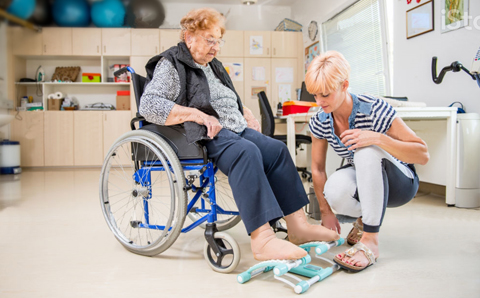Risk Factors for Admission
There are several risks related to living in a nursing home:
- Age. The chance of entering a nursing home increases with age.
- Low income.
- Few family members available and little social activity.
- Physical or mental difficulties.
- Race/ethnicity. White people are more likely than other groups to go into a nursing home.
- Geriatric syndromes (such as frailty, frequent falls, pressure sores, dementia, etc.) also increase the risk of being in a nursing home.
Reasons for Living in a Nursing Home
People in nursing homes go there for four general reasons:
- Short-term Skilled Care. About 20 percent of of people currently in nursing homes have been there for 3 months or less. They generally need skilled nursing or rehabilitation and other therapy services for a short period of time. They often don’t need services for more than a few months. Their need for skilled care often relates to:
- Having been in the hospital for infection or another illness
- Having a need for rehabilitation or other type of therapy due to a temporary disability or after a surgery, such as a hip replacement
- Needing care at the end of their lives
- Long-term Needs. They have a long-term set of disabilities and skilled nursing needs that cannot be delivered in their home. For example, people in nursing homes may have had a stroke that prevents them from taking care of their own needs, such as bathing, dressing, or eating.
- Around-the-clock Supervision. They may need supervision because they have a dementia like Alzheimer’s disease that causes cognitive problems. Or, they have a mental health condition, like severe depression, that leaves them unable to care for themselves.
- Memory Care. Dementia and some mental health problems can cause some people to depend on others for reminders to carry out daily activities or help in doing them. Problems can also include difficult behaviors, such as abusing others, wandering, or problems communicating. These people may need supervision, along with other types of help.
People can have more than one type of problem. For example, most residents have cognitive impairment and need help with their daily activities.
Characteristics of Nursing Homes
Nursing homes increasingly offer medical services similar to those of hospitals for people with short-term needs. Medical services vary, but often include:
- Skilled nursing care
- Orthopedic care (care for muscle, joint, and bone problems)
- Breathing treatments
- Support after surgery
- Physical, occupational, and speech therapy
- Intravenous therapy and antibiotics
- Wound care
Nursing homes also provide:
- Nutritional counseling, social work services, and recreational activities
- Respite care (short breaks for family caregivers and end-of-life care, including hospice.
Nursing homes don’t provide the same intense medical care that hospitals do. These homes don’t have as many doctors and nurses available. Homes generally don’t have services, such as labs and radiology.
Choosing a Nursing Home
Your healthcare professional (likely a home health nurse or social worker) can recommend nursing homes for you to consider, if needed.
The website gives scores for nursing home quality measures, including data about people having:
- Vaccines, like the flu vaccine
- Physical restraints that keep them from moving
- Falls
- Pressure sores
- Weight loss
Older adults or their family members can visit several homes to get a sense of the overall feeling and quality of care. A visit may last an hour or two and involve talking with the admissions staff, nursing home administrators, directors of nursing, and social workers.

